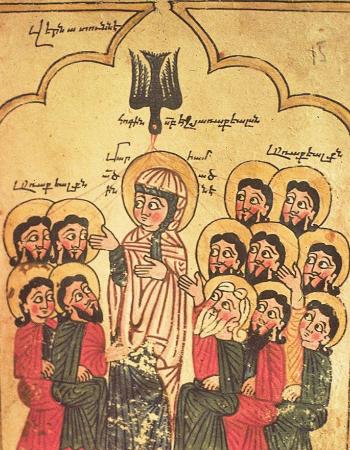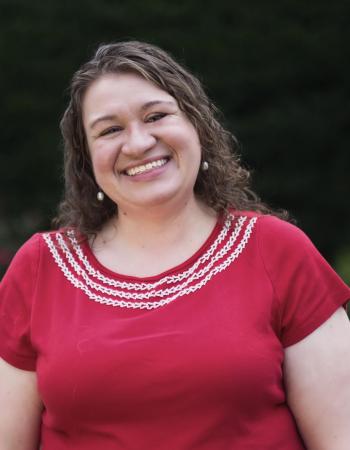I often hear priests whose sermons I admire say that they preach the sermon they need to hear. Other priests say their sermon was given to them by the Holy Spirit. This blog post is, in effect, the sermon I need to hear right now. I pray my words come from the Holy Spirit, especially as today we are celebrating Pentecost! (Some of our sisters and brothers in the Oriental Orthodox churches celebrated Pentecost last week; I pray these words will still be useful to them as well.)
In today’s Gospel, Christ tells us that those who believe in Him and have received the Holy Spirit will have rivers of living water flowing from their hearts. Now, I personally don’t know anyone who has water flowing out of their heart, nor have I ever read of someone who has. I am sure it isn’t because I haven’t ever met someone who believes in Jesus. I am not theologically trained, but when Christ speaks of this “living water” I think he is speaking of love. Besides water, what else could be as life-giving as love--that which always comes from God?
Sadly, during the last few months, I have seen a shortage of life-giving love--often, and most troubling, from my fellow Orthodox Christians.
“Love thy neighbor”, Jesus tells us. Yet many Orthodox are unwilling to wear a mask that might protect the life of a neighbor from COVID-19. “My rights!” those people cry, ignoring the fact that we are called to follow Christ’s example and to put others’ needs before ourselves. Are we practicing Christians or not?
We know women play an important role in the Church, yet too many services held in Orthodox parishes during the pandemic have included only men. Women can sing or chant the responses during a Liturgy as well as men do. Isn’t the presence of women just as important during a pandemic as any other time? In the context of a parish, can it really be a liturgy of the faithful if only one gender is represented?
Most troubling has been the response to the death of George Floyd and the recent protests over the murder of yet another black man, which thankfully I think all agree is a tragedy. Our hierarchs have forcefully said that we, as Orthodox Christians, reject racism. They remind us all humans are made in the image and likeness of God. Yet when we see and hear the suffering of our sisters and brothers of color--especially African Americans--too many are happy to respond by doing nothing, or to condemn rioters and ignore the peaceful protesters. Some take refuge in simply praying words. “Pray, repent, pray, repent… why would we do more?” one person told me on Facebook. Prayer and repentance absolutely need to be in our toolbox in addressing our country’s systemic racism. But they cannot and must not be our only tools. One thing that has helped open my eyes is a quote from Professor Angela Davis: “In a racist society, it is not enough to be non-racist, we must be anti-racist.”
In yesterday’s Gospel, Jesus tells Peter to feed and tend His sheep. Both of those are active verbs. Notice that He didn’t tell Peter to sit around and pray. He told Peter to act. Too often in today’s Church we see the faithful, including priests and even hierarchs, telling us to pray away a problem. (Gun violence? Pray! Racism? Pray!) Prayer is, of course, an action--it is a thing we do. But it isn’t enough. If prayer were enough, the disciples would not have traveled the world preaching and teaching the Gospel. If prayer were enough, Jesus would not have told us in the Parable of the Last Judgment that those who go into eternal life will be those who fed, clothed, and visited Him (by doing those things to others). If we were not called to action, in the Parable of the Talents, the man who buried his talent and hoped for the best would not have been cast into the outer darkness--while those who worked to grow their talents were rewarded. There are countless examples of Jesus and the disciples telling us that faith is not enough--works are also required.
Christ certainly knew the importance of prayer, and we also have examples of times when He “went away to pray”. Prayer is internal, though, and if we want to have a true impact on racism and be anti-racist, we must act externally as well. We can pray for God’s help, but we must remember that on Earth we are God’s hands and feet! In praying for His help, we should be asking Him to help us in our actions.
To be clear: none of the work that we need to do in our hearts, our homes, our churches, or our countries can be done without the presence and aid of the Holy Spirit. It also cannot be done without the Holy Spirit softening our hearts and opening our eyes to the need to take action.
This Pentecost I pray that all God’s faithful receive the Holy Spirit. Even more, I pray that receiving Its Holy Fire energizes us to become sources of living water and love, by living into God’s repeated calls to take action.

If you aren’t sure how to take action about racism, here are some examples of things you can do:
- Read. Start a book group at your church focusing on books about race.
- Learn. The reality is that some of us only have to learn about racism, rather than to experience it on a daily basis. There are thousands of resources online--seek some out and read them.
- Listen more to the voices of people of color. Believe what they’re telling you about their lives.
- Volunteer.
- Have difficult conversations. If a conversation about race makes you feel uncomfortable, think of George Floyd’s pain as he died. Keep having those conversations. They won’t always go perfectly, but that’s okay.
- Look at your list of friends. Is it racially diverse? If not, work to change that.
- Look around your church. Is it racially diverse? If not, ask yourself and others why not, and work to make it a welcoming place for everyone.
- Write your priest and hierarch. Tell them that you want to see the Church do more to support our sisters and brothers of color and to help end systemic racism.
- Support minority-owned businesses.
- Love as God loves us. He sent His beloved Son so that whoever believes in Him might not perish, but have eternal life. Be willing to give up things you love for others.
- Love as Christ loves us. Be willing to be crucified--if only a little. Be willing to be unpopular and call out others’ racist comments.
- Love as the Holy Spirit loves us: strive to be a comfort, a spirit of truth, a giver of life to others.
This Pentecost, let us hear the words of the familiar prayer with fresh ears, and read it with fresh eyes: “O Heavenly King, Comforter, Spirit of Truth, You are everywhere and fill all things. Treasury of blessings and Giver of life: come and abide in us, and cleanse us from every impurity, and save our souls, O Good One!”
May the Holy Spirit abide in every one of us as we go forth, take action, and above all: LOVE.
Anne Wilkinson, MBA, is treasurer of Axia Women and heads Outreach at her home parish where she also is Assistant Choir Director (or was, pre-COVID). She works for a large hospital where she is the volunteer coordinator for high school volunteers. She is currently reading "How to Be an Anti-Racist" and plans to continue to find ways to be actively anti-racist and love all of her neighbors.



